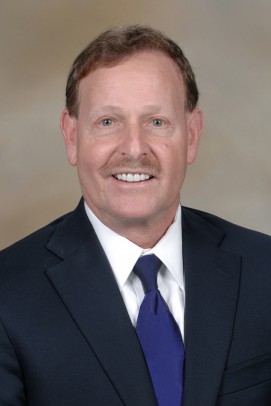New health affairs leader
By Howard Wolinsky — Alumni Magazine
On Jan. 1, Dr. Robert A. Barish assumed the role of UIC vice chancellor for health affairs, a position that includes oversight and coordination of education, research and health care delivery among UIC’s seven health science colleges. He also has primary responsibility for the University of Illinois Hospital & Health Sciences System (UI Health), including its hospital, clinics and federally qualified health center sites.
Barish previously served as chancellor for the Louisiana State University Health Sciences Center at Shreveport for seven years. From 1985-2009, he held several positions at University of Maryland School of Medicine in Baltimore, including chief of emergency medicine and associate dean, then vice dean, for clinical affairs. He helped lead a state-dispatched medical regiment to Jefferson Parish, Louisiana, to deliver emergency care to more than 6,000 Hurricane Katrina victims. While serving as flight surgeon in the Maryland Air National Guard, Barish was among a select group invited to become a NASA astronaut candidate in the early 1990s.
“Dr. Barish brings enormous strengths to UIC that will help us improve our educational, research and clinical health care enterprise, and align the academic and clinical missions of our health science colleges and patient care services,” UIC Chancellor Michael Amiridis said in an email welcoming Barish to campus Jan. 11. “His vast knowledge will serve our campus well.”
How does your new role alter the structure and character of UIC’s health care delivery system?
Barish: Under previous protocols, a vice president for health affairs reported directly to the university president while assuming responsibility for its health care delivery system, including hospitals and clinics. As vice chancellor for health affairs, I report to UIC Chancellor Michael Amiridis, and not only oversee patient care, but academic and research enterprises. Integrating and aligning those endeavors promotes potential synergies, helping to ensure success of the entire enterprise. I believe it’s the right model to continue serving the state’s health care needs and moving UIC forward as a national leader for health equity. It also provides our students unique interprofessional educational opportunities.
How will the organizational change impact faculty, staff and students?
Barish: I don’t expect dramatic change overnight. I believe it’s important to first listen and learn and evaluate the viewpoints and ideas of people who have been here. I’d initially like to focus on establishing the myriad relationships necessary for fulfilling my role.
[Functioning] as a single institution, we’ll have greater opportunity for collaborative research and interdisciplinary education [as we move forward.] We can model what’s best about individual units and encourage innovation and collaborative program development.
There also will be opportunity to enhance philanthropy and community service initiatives. Working together, we can address key health needs in the state and communities we serve.
How will you alter the branding of academic, clinical and research operations at UIC?
I’d first like to get a feel for UIC — its culture and stakeholders. Branding is important. I’ve experienced rebranding and learned it takes time and thoughtful consideration and analysis to get it right.
The hospital provides care to significant numbers of underserved people, many of whom rely on Medicaid. How do the state’s financial woes impact that mission?
Health budgets are under strain in many states. I experienced many budget cuts in Louisiana. Because of our mission, we have to work through them. In academic medicine, we say that a safety net institution like UIC cares for the needs of a special population — the underserved — in addition to the special needs of the population at large. These budget woes aren’t going away anytime soon. To continue our very noble mission, we have to be smart and get creative. It’s vital that this institution continue to serve the people of Chicago, the state of Illinois and beyond.
Tell us about your experiences with NASA.
In 1992, while serving with the Maryland Air National Guard, I was among a select group invited to Houston interview as a candidate for mission specialist. I’ll never forget the NASA coordinator saying, “You’ve all got the right stuff. Now it’s a matter of passing the rigorous tests.” Unfortunately, I was not selected because of a very minor anomaly. Still, it was the experience of a lifetime.
— Reprinted with permission UIC Alumni.
Categories

